First hello world program in c; Through this tutorial, you will learn how to write the first hello world program in c programming language.
How to Make First Hello World Program in C
- Simple Hello World Program In C
- Hello World Program using Functions in C
Simple Hello World Program In C
#include <stdio.h>
int main()
{
printf("Hello World");
return 0;
}
Hello World Program using Functions in C
#include
void hello(){
printf("Hello World");
}
int main()
{
//Calling a function here
hello();
return 0;
}
Let’s start with a basic introduction of various code statements, which are used in the above C Hello World program; as shown below:
- 1.
#include <stdio.h>– This statement tells compiler to include this stdio.h file in the program. This is a standard input output file that contains the definitions of common input output functions such as scanf() and printf(). In the above program we are using printf() function. - 2.
int main()– Here main() is the function name and int is the return type of this function. Every C program must have this function because the execution of program begins with the main() function. The 0 return value of this function represents successful execution of program while the return value 1 represents the unsuccessful execution of program. This is the reason we havereturn 0;statement at the end of this main function. - 3.
printf("Hello World");– This function displays the content within double quotes as it is on the screen. - 4.
return 0;– As mentioned above, the value 0 means successful execution of main() function.
